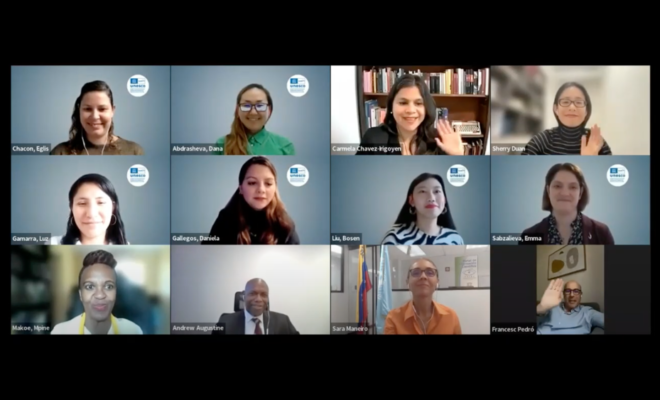A more real approach to a Sustainable Education Model can be achieved after the COVID-19 Pandemic

 On June 24th, the Director of the International Institute for Higher Education in Latin America and the Caribbean, Francesc Pedró, presented the report “Analysis of impacts, political responses to the COVID-19 pandemic and recommendations for the day after” in the webinar «La Educación Superior en la Actual Coyuntura» (Higher Education in the current situation) moderated by Luis Bonilla Molina of the Centro Internacional “Otras Voces en Educación” OVE (International Centre “Other Voices in Education”) from Venezuela.
On June 24th, the Director of the International Institute for Higher Education in Latin America and the Caribbean, Francesc Pedró, presented the report “Analysis of impacts, political responses to the COVID-19 pandemic and recommendations for the day after” in the webinar «La Educación Superior en la Actual Coyuntura» (Higher Education in the current situation) moderated by Luis Bonilla Molina of the Centro Internacional “Otras Voces en Educación” OVE (International Centre “Other Voices in Education”) from Venezuela.
This meeting was made possible thanks to the organization of the Cooperativa de Educadores e Investigadores “Histórica” CELIC (“Historical” Educators and Researchers Cooperative CELIC) of Argentina, the Centro Internacional de Pensamiento Crítico “Eduardo del Río (Rius)” CINPECER (International Centre for Critical Thinking “Eduardo del Río (Rius)”) of Zamora, Mixoacán, Mexico and the International Centre “Other Voices in Education” of Venezuela together with IESALC.
Also participating were Luz Palomino, Director of the International Centre “Other Voices in Education” of Venezuela, who also moderated the virtual meeting; María Rosa Goldar, Professor of the Colectivo CEAAL Consejo de Educación Popular de América Latina (Collective Popular Education Council of Latin America), who began the debate with a reflection on the dilemma of “the university as a private business vs. the public university as an international right to education”.
Olmedo Garcia, dean of the Faculty of Humanities at the Universidad de Panamá, intervened by asking what model of education can be carried out in a sustainable manner when the budget for 2020 is reduced by 25%? This has a direct impact on the functioning of the institutions.
Faced with these questions, Pedró assured that there are no simple answers and stressed that in the institutions which IESALC has been able to contact and learn about their work, there is a commitment throughout the community to achieve a sustainable educational model.
For the director of the IESALC “In this emergency technology is a key piece for the pedagogical continuity. But before the pandemic there was a technological gap, and now it could become a fracture, motivated by the irruption of an economic model and a production model penetrated by technology that, in the region, is selective”.
Likewise, Francesc Pedró stated that “If we don’t do our job well, we can turn gaps into fractures. The real battle lies in the fight against poverty, and this requires a multidimensional approach from other sectors of public policy that fight against poverty, not only from higher education”.
RELATED ITEMS








